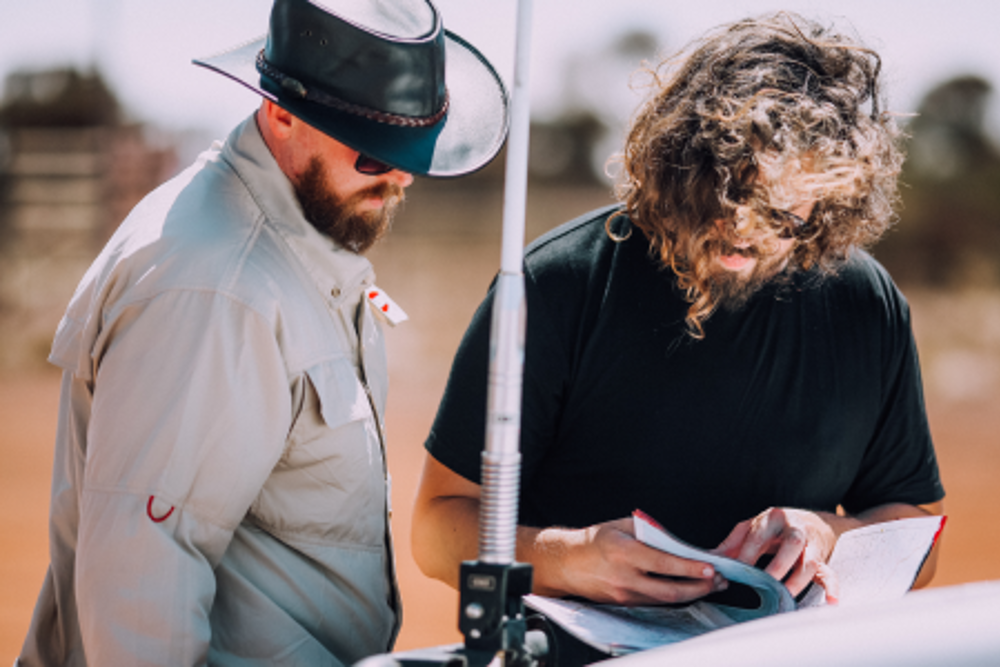How to become a park ranger



While a career as a park ranger is a great choice for someone passionate about conserving terrestrial and marine parks, forests and wildlife, there is much more to this job than being out in nature.
It's a varied job encompassing an extensive list of responsibilities and activities. One day, you could be granting park permits; the next, you could be battling a bushfire.
While formal qualifications are not mandatory, they are beneficial. Tertiary qualifications like the Diploma of Conservation and Ecosystem Management from South West TAFE, together with relevant work experience can give you a competitive advantage in this rewarding field.
If you have a passion for nature and want to make an impact while working in some of Australia’s most breathtaking natural landscapes, read on as this article covers how to become a park ranger.
What is a park ranger?
A park ranger is a person whose job it is to control a ‘State or National Park, scenic area, historic site, nature reserve, recreation area or conservation reserve under authorised policies and priorities.’
What does a park ranger do?
When most people think of a park ranger, they usually imagine someone out and about in the wilderness, wearing a khaki uniform. While that is mostly true, being a park ranger is as varied as the environments they manage.
Generally, a park ranger's responsibilities fall into three categories: managing natural values, visitor services and operational duties.
Managing natural values
Protection of natural and cultural sites:
- Ensuring natural resources and culturally-significant sites are protected.
- Protecting, enhancing, and managing natural, recreational and cultural assets.
- Promoting and maintaining historic assets.
- Identifying and protecting populations of threatened or endangered animals.
- Identifying and controlling weeds and pest animals that pose threats to native species.
- Developing cooperative relationships with local Indigenous groups.
Environmental management:
- Wildlife and habitat conservation efforts, including monitoring and protecting endangered species.
- Managing invasive species and habitat restoration.
- Assisting with fire suppression (firefighting) and emergency response during the fire season.
- Managing natural resources to maintain biodiversity and reduce land and waterway pollution.
- Granting permits and overseeing researchers studying within the park.
Visitor services
Park facilities and infrastructure:
- Maintaining and developing visitor facilities such as toilets, picnic and camping areas, and trails.
- Overseeing maintenance of signs, trails, car parks, campgrounds, shelters, and playgrounds.
- Ensuring facilities comply with safety standards and environmental guidelines.
Educational and interpretive programs:
- Providing educational programs to enhance visitor understanding of parks.
- Leading visitors through park tours and presenting informational talks.
- Delivering information, events and services to schools and the public.
Visitor engagement and assistance:
- Advising on activities, including trail maps and safety.
- Assisting visitors in planning activities and overseeing camping,
- including compliance and fee collection.
Emergency and public safety:
- Responding to park emergencies such as search and rescue or medical incidents.
- Enforcing park regulations to ensure visitor safety and resource protection.
- Collaborating with law enforcement on accidents, complaints, or illegal activities.
Operational Duties
Park management and planning:
- Monitoring and reporting on park conditions to ensure alignment with operational plans.
- Conducting regular park inspections.
Infrastructure and project management:
- Overseeing maintenance and development projects for park facilities and trails.
- Project management for maintenance within national parks.
Community and volunteer engagement:
- Working with volunteers on tasks such as weed control and maintaining infrastructure.
- Organising community events and outreach programs.
Public relations and communication:
- Monitoring and granting permits for businesses operating within parks.
- Communicating park policies through social media, brochures and public updates.
- Promoting environmental stewardship and responsible recreation.
As you can see, life as a park ranger is a varied career.
Personal requirements of a park ranger
There is more to being a park ranger than knowing your koalas from your kangaroos. Park rangers will find they regularly deal with visitors, which may include tough tasks like issuing fines or responding to fires. This means park rangers must have a mix of soft and technical skills to see them excel in the role.
Soft skills
- Rangers need strong communication to interact with people from all walks of life.
Park rangers need to be good problem solvers. Working outdoors often comes with unexpected challenges, so sometimes, you need to be quick on your feet. - Rangers must have an eye for detail to ensure everything is as accurate and well-kept as possible.
- You’ll be working with many people, including other rangers, government departments and the local community, so you’ll need to collaborate well.
Technical skills
- A sound understanding of local flora and fauna.
- A background in environmental management or recreational park experience gives potential park rangers an advantage.
- First aid skills are also essential. For example, park rangers might need to assist a cyclist who has been injured or look after someone suffering from a snake bite.
How to become a park ranger
Competition for positions in park management is strong, with candidates needing a formal tertiary qualification and relevant work or volunteer experience.
Tertiary education
South West TAFE offers a hands-on Diploma of Conservation and Ecosystem Management, where you'll dive into the theory and practical skills needed to protect and manage ecosystems across diverse environments, from coastal and rural areas to urban spaces and aquatic systems.
This qualification can lead to careers as park rangers, environmental consultants, conservation officers and coast care managers.
Marine parks
To work in Australian marine parks, certain qualifications and certifications are required. A coxswain qualification and a diving licence are necessary for those involved in marine activities. Additionally, a Working with Children (WWC) check is essential for guiding tourists, and a valid driver’s licence and first aid certificate are also required to ensure safety and compliance with regulations.
Volunteering
Volunteering is an excellent way to boost your resume. Organisations like the Victorian National Parks Association offer opportunities for budding park rangers to help protect and enjoy nature through jobs like taking part in habitat restoration projects or leading bush walks.
Seasonal work
Seasonal rangers are hired to join the workforce during peak visitation periods. They are key in managing the area, focusing on customer service, education, interpretation and overseeing visitors and facilities."
Like all positions in government agencies, you will be required to complete a Police Record Check at some stage.
Where do park rangers work?
Park rangers in Australia are lucky to work in some of the most jaw-dropping and ecologically diverse landscapes on earth. As a park ranger, here are some of the locations you might be working in:
- National and state parks: From lush rainforests to rugged outback landscapes, each state and territory boasts its slices of paradise; at home in Victoria, we count Great Otway National Park and Grampians National Park among these wonders.
- Marine parks and coastal reserves: With countless islands and vast stretches of coastline, marine parks like the Twelve Apostles Marine National Park and Eagle Rock Marine Sanctuary, offer underwater worlds just waiting to be explored.
- Historical sites: Victoria has numerous heritage-listed sites, including Old Portland Cemetery, Mary Mackillop Stone Well and Cape Otway Light Station.
- Indigenous Protected Areas: Over 20% of Australia is held in Indigenous ownership (IPA’s) and these IPA’s areas are managed by First Nations communities. Park rangers working in locations like Budj Bim Cultural Landscape blend ancient wisdom with modern know-how to honour tradition and protect the land.
Where are park ranger jobs advertised?
Park ranger jobs are advertised in a variety of places so it’s good to keep across or set up alerts to be notified of new positions when they are advertised:
- Seek
- Newspapers
- Local councils
- Parks Victoria
- Federal Government
- Indeed
You can find information for each state and territory’s parks department here:
- NSW – National Parks and Wildlife Service (NPWS)
- VIC – Parks Victoria
- QLD – National Parks Association of Queensland
- WA – Parks and Wildlife Service
- SA – National Parks and Wildlife Service South Australia
- TAS – Tasmania Parks & Wildlife Service
- NT – The Parks and Wildlife Commission
Why become a park ranger?
There are many benefits to this rewarding career, including
- Time outdoors: From rainforests to coastal environments, you’ll spend much of your time outdoors in nature as a park ranger.
- Intrinsic rewards: Park rangers often find fulfilment in preserving nature, protecting wildlife and contributing to conservation efforts.
- Job security and opportunities: Many government and environmental organisations offer long-term employment opportunities in various parks and reserves.
- Low stress: Working in serene natural environments typically leads to lower stress levels, as the job allows you to be away from the hustle and bustle of urban life.
- Health benefits: The physical demands of the job, combined with time spent outdoors, can contribute to improved mental and physical health, including better fitness and lower stress levels.
- Helping others: Park rangers play an important role in educating the public about conservation, wildlife and the environment, giving them a chance to impact others positively.
- Job variety: The role offers a wide range of duties, including wildlife management, visitor services, environmental monitoring, and park maintenance, ensuring no two days are the same.
How much does a park ranger earn?
A park ranger’s salary is generally competitive, but several factors will influence the starting salary you can expect. These include the specific park agency hiring, the size of the area you'll be responsible for, the nature of the role, your position, and your education and experience.
Salary averages for a park ranger in Australia can range from $69,714 to $96,073
If you love the outdoors and protecting nature, and have an eye for detail, then becoming a park ranger may be the ideal career path for you.. For further information, contact South West TAFE, who can explain the pathways to becoming a park ranger.